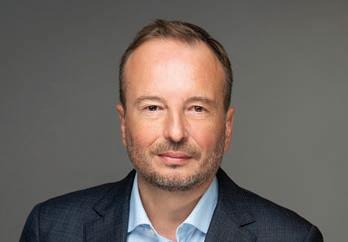
7 minute read
Personalised advice in the digital age
Digital transformation has been a key battleground for financial services providers in the Middle East region—a competition that was intensified by the outbreak of the coronavirus more than two years ago. The ability to swiftly innovate and effectively meet client expectations while capturing future growth segments is turning into a core asset in the wealth management sector. “The acceleration in market and competitive wealth management trends, along with the confidence many firms have gained in their remote delivery management amid increasing focus on responsible investing while emphasizing the role of wealth managers in supporting socio-economic ecosystems.
Advertisement
Wealth managers are being confronted by the task of balancing the traditional approach to risk management with the need to respond quickly to the ongoing health crisis that has created massive changes to their operating environment.
Meanwhile, the changes in demographics, technological innovations, environment and social behaviours have set the ground for rapid transformation in the wealth management industry.
capability, have set the stage for a strategic reset of firm operating models,” said Deloitte.
The pandemic accelerated preexisting trends in wealth management by changing the way wealth managers deliver advice and serve their high-networth individual (HNWI) clients. Globally, the wealth management segment is evolving, and the Middle East market is no exception.
According to BlackRock, COVID-19 accelerated digitisation of processes and client propositions, a shift towards centralised portfolio and risk
The next frontier
Wealth management is typically seen as embodying old-fashioned values and providing discrete, tailored service attributes that remain valuable parts of the business, but McKinsey said for many clients, these qualities are “no longer sufficient”.
Though incumbent banks in the Middle East region are working on strengthening
their wealth management businesses, they are facing growing competition from wealth technology platforms that are developing advanced businessto-business (B2B) and business-toconsumer (B2C) digital solutions.
“The client experience has been the prompt for the digital transformation journey of wealth management companies,” said Deloitte.
The growth of automated wealth managers or Robo-advisors is revolutionising the wealth management industry with unprecedented force. Kenneth Research said that the Middle East and Africa’s Robo-advisory market is projected to grow at an overall compound annual growth rate (CAGR) of 55.9% to $3.8 billion by 2023. Robo-advisory platforms in the region are quickly taking off, with several homegrown players having recently joined the onrush.
Commercial Bank of Dubai unveiled its Robo-advisory app CBD Investr in April 2021. The platform offers the bank’s clients access to globally diversified and personalized portfolios of stocks, bonds, and other asset classes using low-cost exchange-traded funds.
CBD Investr is competing with Sarwa and FinaMaze in the UAE. Sarwa offers curated portfolios, including conventional, halal and bitcoin offerings while FinaMaze’s AI-powered hybrid Roboadvisory solution is used to identify the natural financial behaviour, risk appetite and goals of each investor.
The Robo-advisory solution provider launched two new smart portfolio themes, Cryptocurrency and Inflation Protection, in June and plans to expand its services to prime retail investors with a minimum of $2,000 to invest. By leveraging algorithms to offer financial advice for a fraction of the price of a real-life client advisor, Roboadvisors are growing at a rapid pace, doubling their assets under management every few months.
Bahrain’s central bank issued directives on Robo-advisory in 2019 as the small Gulf state affirmed its position as the region’s leading digital financial hub. Meanwhile, Saudi Arabia’s Derayah Smart provides retail investors with access to a globally diversified and multi-assetsbased strategy managed by investment specialists. The platform’s Shariahcompliant competitor, Haseed Invest, provides investment opportunities in globally diversified Islamic assets using Exchange-Traded Funds (ETFs) and mutual funds.
The UAE and Saudi Arabia’s regulatory environments are driving the Roboadvisory market growth in the Middle East and Africa region. The regulatory push for open Application Programming Interfaces (APIs) infrastructure across the region is expected to make it easier for wealth managers to deliver consolidated client views of multiple relationships.
The Abu Dhabi Global Market’s Financial Services Regulatory Authority issued its regulatory framework for digital investment managers operating in the financial hub in 2019—a move that was hailed by Moody’s. The rating agency said that the regulatory framework safeguards systemic stability through a well-regulated environment for fintechs.
THE ACCELERATION IN MARKET AND COMPETITIVE WEALTH MANAGEMENT TRENDS, ALONG WITH THE CONFIDENCE MANY FIRMS HAVE GAINED IN THEIR REMOTE DELIVERY CAPABILITY, HAVE SET THE STAGE FOR A STRATEGIC RESET OF FIRM OPERATING MODELS
– Deloitte
– Kenneth Research
Digital native
Once a laggard in the adoption of technology, wealth management is accelerating digitalisation, deploying artificial intelligence (AI), Big Data, robotics and other innovative technologies to enhance client’s experience and trust—which is central to the industry’s relationships.
A coherent digital transformation plan will give firms a head start in leveraging stronger client relationships, reduced operating costs as well as enhanced risk management and regulatory compliance capabilities. “The changes are helping firms meet their regulatory obligations, boosting the productivity of wealth managers and lifting compressed margins,” said McKinsey.
The current operating environment is making it difficult for wealth managers to deliver the kind of inflation-beating returns that keep clients happy. The industry has entered a comparison phase where HNWIs are keen to shop around and do their own research.
Though the typical client in a developed market today is around the age of 65 years
– BNP Paribas
and is comfortable with digital technology, shifting demographics, evolving client behaviours, the rise in new innovative technologies and emerging disruptive competition are all reshaping the industry.
Incumbent banks should set their minds on eradicating the pain points that clients encounter when working with wealth managers to maintain a competitive edge and digital onboarding is a huge issue. Industry experts say onboarding a typical HNW client used to take two-thirds of regional firms well over two weeks and the process was not only lengthy but also arduous due to the paperwork involved as most wealth managers were yet to completely digitalised onboarding.
Similarly, automation, systems integration and interdepartmental collaboration stood at shockingly low levels and unnecessary delays loomed large even for clients with quite simple profiles, while for clients with more complex profiles onboarding is taking as much as six months.
Customer onboarding is the first contact that a new user has with the bank and the process should be intuitive, seamless, responsive and efficient. It is defined as the guidance of customers in the first steps of platform accessibility and a critical step in a customer’s journey with a financial institution as it leaves a long-lasting impression in the clients’ minds about how they perceive a financial institution.
Deloitte said that an automated onboarding process is a mutually beneficial situation offering speed, efficiency and convenience for the customers and freeing bankers for more value-added tasks. The implementation of an automated customer onboarding process is an essential feature that determines whether or not a financial institution can obtain new customers.
COVID-19 ACCELERATED DIGITISATION OF PROCESSES AND CLIENT PROPOSITIONS, A SHIFT TOWARDS CENTRALISED PORTFOLIO AND RISK MANAGEMENT AMID INCREASING FOCUS ON RESPONSIBLE INVESTING WHILE EMPHASIZING THE ROLE OF WEALTH MANAGERS IN SUPPORTING SOCIOECONOMIC ECOSYSTEMS
– BlackRock
Growth prospects
The Middle East, one of the world’s hotbeds of wealth creation, has seen an acceleration in trends relating to succession planning, alternate investment vehicles, wealth preservation, digitalisation in wealth management and growing interest in sustainable investing.
Julius Baer said that there’s an emergence of the next generation of clients—a generation that looks beyond the traditional ways of wealth preservation, especially in the Gulf region.
Wealth managers are being confronted by the task of balancing the traditional approach to risk management with the need to respond quickly to the prolonged pandemic that has created massive changes to their operating environment.
“With the proliferation of investment products, digitalisation, the heterogeneous nature of client bases and the need to integrate strong sustainability criteria into their business, the wealth manager’s role has become even more complex,” said BNP Paribas.
Over the past two years, business ethics have moved to the forefront as metrics to identify how well a company is performing amid growing demands from investors that environmental, social and governance (ESG) issues be factored into their portfolios. The World Economic Forum (WEF) said in a report in January that HNWIs and family wealth are uniquely positioned to leverage private capital to drive growth in the ESG sector by supporting long-term societal goals and ambitions. Wealth management is one of the most attractive sectors within the financial services sector, thanks to the business’ greater growth prospects, lower capital requirements and a higher return on equity (ROE) compared to most other retail banking businesses.










